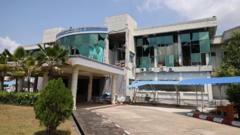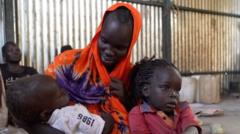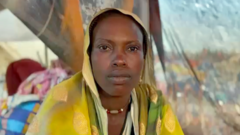This article sheds light on the hardships faced by healthcare professionals in northern Ethiopia, particularly the challenges endured by Mehari during the civil war, emphasizing the complex interplay of politics and personal sacrifice in the region.
Ethiopia's Harrowing Experience: Doctors, Soldiers, and Endless Agony

Ethiopia's Harrowing Experience: Doctors, Soldiers, and Endless Agony
A glimpse into the life of healthcare workers in Tigray amid an ongoing civil war, revealing the human cost of Ethiopia's conflicted landscape.
Before war erupted in Ethiopia in late 2020, Mehari could rely on a bus to reach her job as a doctor at a public hospital in Axum, Tigray. However, conflicts between the ruling Tigray People’s Liberation Front (TPLF) and the federal government quickly halted public transport. Instead, Mehari found herself walking 40 minutes each day, often in fear of the soldiers enforcing a stringent curfew. “Maybe being killed could be the easiest thing that happens to you,” she reflected on those days.
In late 2020, the first signs of the civil war emerged. Mehari recalls her experiences: “I was on duty when the conflict broke out.” Emergencies flooded in, and for the first time in her young life, she witnessed war-related injuries. “It was shocking,” she admitted. Unlike her usual patients—traffic accident victims—these new cases bore the scars of brutal violence. Disturbing stories of neighbors killed and villages devastated became her new normal. “It was chaos. It wasn’t clear at first what was going on.”
Faced with trauma and overwhelming circumstances, Mehari made a significant life choice: she left her hospital role to join the Tigray Defense Forces as a medic, aiding in their resistance against the federal government. Although the armed conflict officially ended in 2022, she continues to grapple with lingering discomfort when she finds herself outside Tigray, signifying the deep emotional imprint of the war.
Ethiopia, a nation marked by its diverse ethnic landscape, has long been embroiled in political tensions. Prime Minister Abiy Ahmed, who ascended to power in 2018, sought to dismantle the longstanding dominance of the TPLF. His administration’s measures, including the removal of Tigrayans from positions of power, ignited resentment among various ethnic groups. Tigray leaders resisted these changes, leading to a chain of events that catalyzed civil unrest and violence—a tragic consequence of competing historical grievances.



















